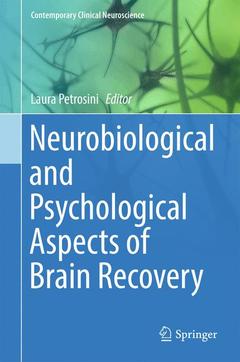Description
Neurobiological and Psychological Aspects of Brain Recovery, Softcover reprint of the original 1st ed. 2017
Contemporary Clinical Neuroscience Series
Language: English
Subjects for Neurobiological and Psychological Aspects of Brain Recovery:
Publication date: 07-2018
Support: Print on demand
Support: Print on demand
Description
/li>Contents
/li>Comment
/li>
The novelty of this book's approach lies in addressing the impact of neurobiological factors as well as psychological influences on brain recovery. There is growing evidence that emotional, motivational, and cognitive factors along with personality traits play a crucial role in brain plasticity, resilience, and recovery. Topics include synaptic and neuronal plasticity, development of brain reserves, biological markers, environmental factors, psychological profile, emotional resilience, and personality traits. By combining the latest research on neural mechanisms and on psychological resilience the authors hope that this book can lead to the development of better treatment strategies for functional recovery from brain damage.
Structural Plasticity in Dendrites: Developmental Neurogenetics, Morphological Reconstructions, and Computational Modeling.- Autophagy Mechanisms for Brain Recovery: Keep it Clean, Keep it Alive.-Environmental Enrichment Repairs Structural and Functional Plasticity in the Hippocampus.- Translatable Models of Brain and Cognitive Reserve.- Cognitive Reserve: A Life-Course Perspective.- Neural Correlates of Brain Reserve: The Neuroimaging Perspective.-Non-Pharmacological Approaches Based on Mind-Body Medicine to Enhancement of Cognitive and Brain Reserve in Humans.- Roles of Synaptic Plasticity in Functional Recovery After Brain Injury.- Integrated Methods of Neuromodulation for Guiding Recovery Following Stroke.- Resilience of Brain Networks After Stroke.- Functional Role of Physical Exercise and Omega-3 Fatty Acids on Depression and Mood Disorders.- Estrogen Neuroprotective Activity After Stroke and Spinal Cord Injury.- Appraisals of and Coping with Acquired Brain Injury: Resources for Functional Recovery.- Premorbid Personality Traits and Brain Recovery: Another Aspect of Resilience.- Psychodynamic Factors of Recovery After Brain Injury: A Role for Defense Mechanisms?.
Research based approach to recovery for neurobiologists and psychologists Addresses the role of emotional, motivational, and cognitive factors to individual patient outcomes Special focus on brain resilience
Includes supplementary material: sn.pub/extras
© 2024 LAVOISIER S.A.S.




